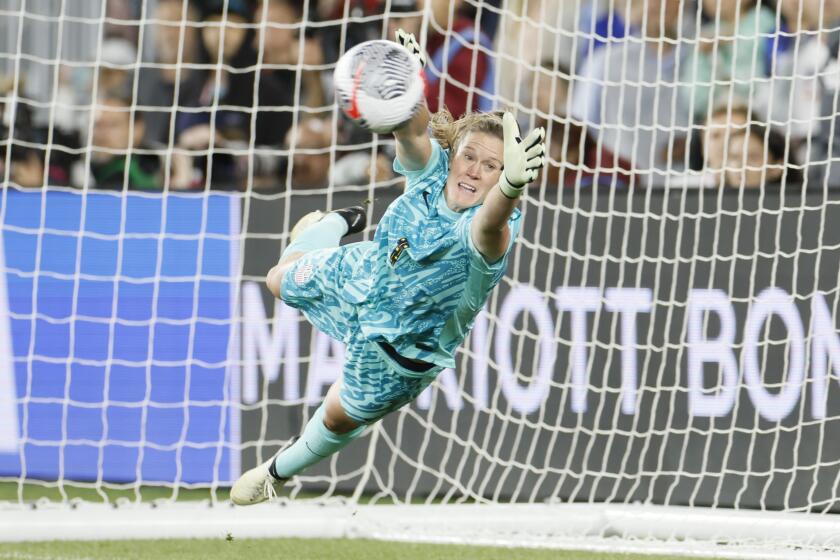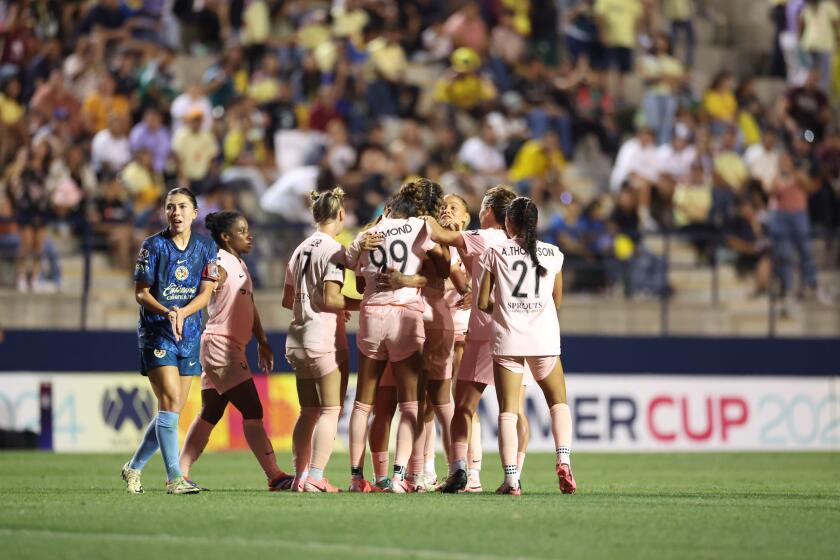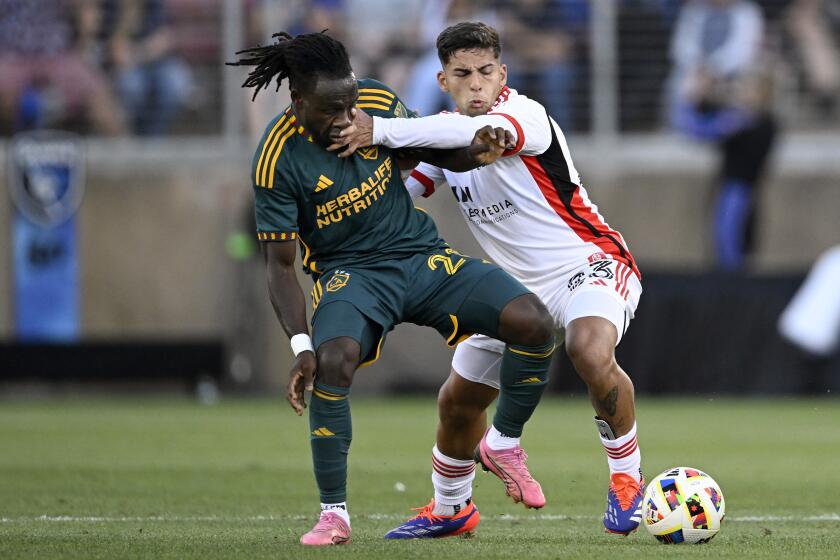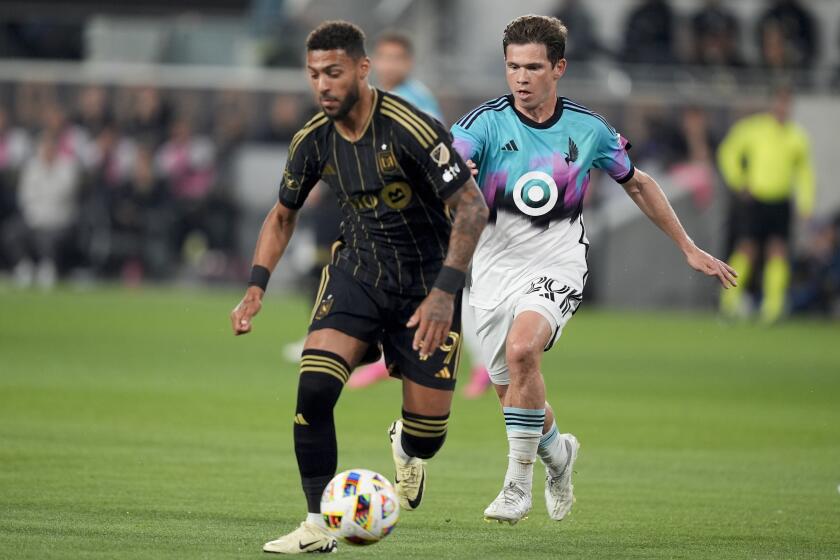European Coaches Are Happy to Jump Before Being Pushed
The European Championship, which ended with France’s dramatic victory over Italy in the final in Rotterdam last Sunday, provides a good example of a curious European phenomenon.
Rather than being dragged out kicking and screaming, top coaches have no qualms about stepping down when things don’t go their team’s way. It’s a matter of honor, apparently.
Of the 16 coaches who began the tournament with high hopes, five resigned during or shortly after the three-week event and a sixth is on his way out. They include some of the biggest names in the sport.
Take, for example, Dino Zoff. All he did was take a so-so Italian team all the way to the championship game. Yet the criticism that came his way after losing the final, 2-1, in overtime, caused him to yell, Arrivederci! in no uncertain terms Tuesday.
“I was offended as a man,” Zoff said of the criticism leveled at him by AC Milan’s multimillionaire owner, Silvia Berlusconi. “I don’t see why people must publicly denigrate the work of others.
“I cannot continue to work under these conditions.”
Zoff is an Italian hero. He was the starting goalkeeper, at 40 no less, when Italy won the World Cup in Spain in 1982, beating West Germany in the final. He is also the only Italian to have won both a European Championship, in 1968, and a World Cup.
Yet Berlusconi labeled him an “amateur” for his handling of the team in Euro 2000 and called Italy’s performance “dishonorable.”
“I don’t take lessons in dignity from Mr. Berlusconi,” Zoff huffed, and walked off into the sunset.
“I didn’t denigrate his work,” a surprised Berlusconi said. “I made a technical critique.”
If he had kept quiet, Italy would have kept a capable coach.
As it is, the job was given Thursday to Giovanni Trapattoni, winner of an unprecedented seven Italian Serie A championships and a German Bundesliga title in a 27-year coaching career that includes stints at such leading clubs as AC Milan, Juventus, Inter Milan, Bayern Munich and Fiorentina.
Trapattoni, 61, once voiced a quote that is apt in the context of this column.
“Coaches are like fish,” he said. “After a while, they start to stink.”
SUCH A DUTCH TOUCH
Frank Rijkaard is another famous coach who bowed out during Euro 2000.
He coached the Netherlands into the semifinals, where in a shootout, the team’s inability to hit a stationary ball 12 yards past a single opponent cost it the chance for glory.
But it wasn’t the miserable penalty kicks of the Dutch against Italy that caused Rijkaard to step down. He believed he had failed to live up to his promise to deliver the European Championship, which he’d won as a player in 1988.
“I’ve shed my tears . . . but it’s all part of football,” he said. “You win and you lose. Perhaps I’m hard on myself, but I’ve been brought up in football and I know the laws.”
On Friday, the Dutch soccer federation named former Barcelona coach Louis van Gaal to replace Rijkaard.
“I’ve always thought that if the opportunity came for me to become national coach, I would grab it with both hands,” said the 48-year-old, Amsterdam-born van Gaal, who won two Spanish league titles, a Spanish Cup and a European Supercup with Barcelona.
WILD WEEK FOR GERMANY
Winning the right to stage the 2006 World Cup made it an eventful week for Germany, which also had an almost bizarre shuffle of national coaches.
Erich Ribbeck, the much-maligned coach who failed to get Germany past the first round of Euro 2000, quit immediately after the final humiliating defeat by Portugal.
“The decision is a consequence of the team’s catastrophic elimination, for which I take full responsibility--no ifs or buts,” Ribbeck said.
There was no shortage of candidates, however, for one of the most difficult jobs in soccer. Germans expect their team to win every event it enters.
At his farewell news conference in Holland, Rijkaard was asked what he would do.
“Well, I could become coach of Germany,” he joked.
Trapattoni was a serious candidate. So was Jupp Heynckes, the German coach of Benfica of Portugal, who said, “Despite its current low, our national team remains the highest goal for a coach.”
In the end the German soccer federation (DFB) settled on Christophe Daum.
Daum, an accomplished motivator who has made Bayer Leverkusen an annual contender for German and European honors, said coaching Germany would be a “dream goal” but that he could not walk out on his club right before the start of a new season.
So the DFB came up with a weird compromise. It named Rudi Voeller, the curly haired, blond striker who helped Germany win the 1990 World Cup in Italy, as caretaker coach through next year, when Daum will take over.
Voeller, 40, has no coaching experience, but will be in charge for most of Germany’s qualifying campaign for the 2002 World Cup. He said his aim was “to make it a joy to play for the national team again.”
Just as it must have been in the Italia ’90 World Cup, when Germany played the Netherlands and Voeller found himself being spat upon--by none other than Rijkaard.
It’s a strange game.





